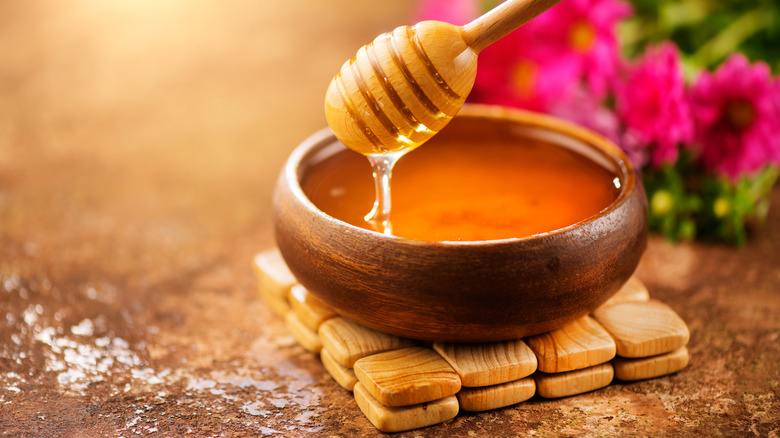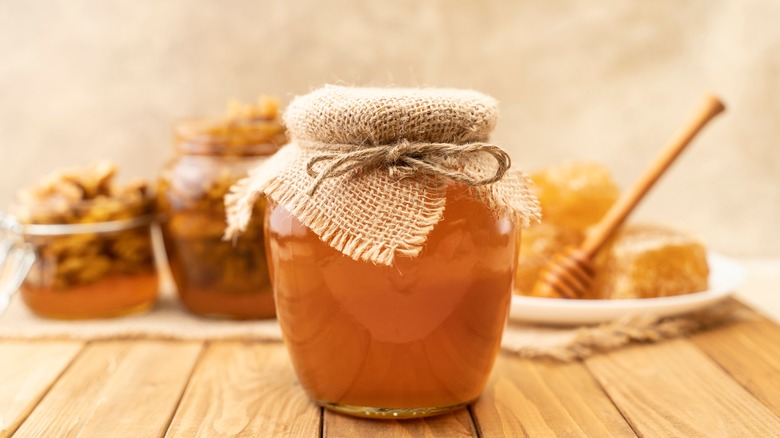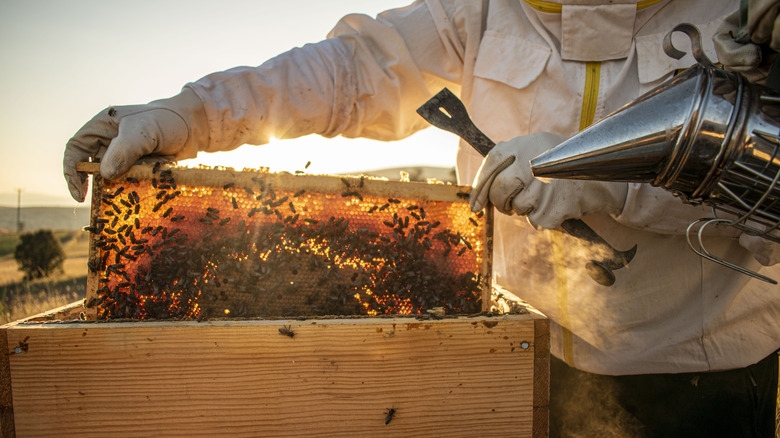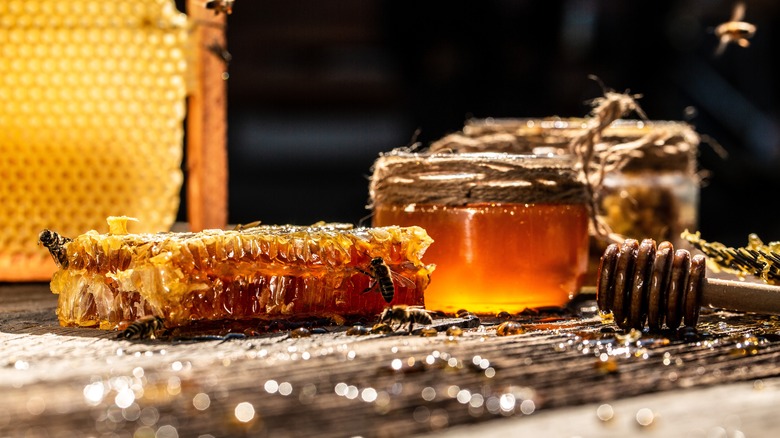Most Of The World's Honey Comes From This Country
Honey is truly the bees' knees: It is delicious-looking, sweeter than nectar, and can be added to nearly anything to make it better. Imagine honey drizzled over pear and gorgonzola pizza, mixed into a dense honey cake, or slathered onto your morning toast. But despite how lovely the food is, its origin is not something you'll want to think too deeply about.
As Bee Culture explains, honey is made from regurgitated nectar harvested by bees from flowers. The bee's stomach enzymes activate a chemical reaction in the nectar and turn it into our favorite kind of sugar.
Honey is one of those rare foodstuffs that can be found in nearly every corner of the world. The U.S. Geological Survey (USGS) says bees are native to every continent except Antarctica and are essential to pollinating the world and supplying us with the crops we need to survive. Countries that grow fruits and nuts are partially dependent on bees to cross-pollinate their crops, so it is beneficial to farm the insects as well as reap the honey they produce.
Several countries around the world methodically harvest honey and maintain bee hives for exactly this purpose.
China's honey industry
China, with its enormous land mass, has quite a variety of agricultural and animal farming available to it. With all its available resources and diversity of plants, it is no surprise that China is also home to many honey bees, and as such, The Science Agriculture lists China as the world's largest honey producer. The types of bees, Apis mellifera and Apis cerana, are what keeps China's important honey provinces like Zhejiang, which accounts for a seventh of China's total honey production, thriving.
According to the United Nations' Food and Agriculture Organization (FAO) in 2020, China produced upwards of 458,100 tonnes of honey out of the estimated 1,850,868 tonnes harvested around the world each year (via Atlas Big). China is then followed by Turkey when it comes to honey production, but the East Asian country conquers the honey industry. Statista says that in 2021, China ended up exporting $260 million worth of honey, which was an increase from the previous year.
The history of honey
When it comes down to it, there is a perfectly good reason why humans have been eating honey for as long as history can remember. According to the JSTOR journal article "Pre-modern Beekeeping in China: A Short History," there is archaeological evidence in China of people chowing down on honey dating all the way back to the 7th millennium BC and the act of beekeeping as early as the 3rd century. China, as well as other parts of the world, have a long relationship with these lovely, little insects.
But bees have been around before humans could record their thoughts on paper, or had paper. Smithsonian Magazine claims that researchers have found links between honey and initial brain expansion. The sweet, syrupy food is energy dense, a source of glucose necessary for developing brain function — and it's easy to digest, making it a staple in humanity's diet. The Scientific American says that the oldest known bee found trapped in amber is 80 million years old, but it is believed that the earliest bees could have appeared 130 million years ago.
The benefits of honey
Though we tend to think of honey as a sweet used to dribble into our teas or flavor our cakes, it is known to be quite good for people. Healthline says that for centuries, honey has been used to cure ailments both internally and externally. If you've ever experienced a sore throat, you probably sucked on a spoonful of honey to calm the ache, but honey can also be applied topically to help heal burns and other wounds. Physicians have been using honey to heal since the days of ancient Egypt, which is why it was such a widely-revered commodity.
The Mayo Clinic claims honey has fantastic antioxidant properties that can help with things like cardiovascular disease, coughing, gastrointestinal disease, oral rehydration, and to ease neurological diseases with its antidepressant and anti-anxiety benefits. Honey has been and continues to be used for therapeutic and health treatments around the globe and is a fantastic way to ward off diseases of all kinds, not to mention how delicious the natural sweetener is.
According to the National Library of Medicine, honey is the only natural product made from insects that has nutritional, cosmetic, therapeutic, and industrial abilities and benefits. It is quite literally liquid gold and should continue to be used and enjoyed for many years to come.



